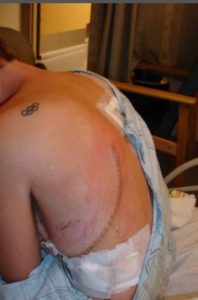
10 Facts You Should Know About the Unsafe Practice of Dry Needling
By: Michelle Gellis LAc MAc DiplAc
Over the past few months some of my patients have shared with me that they have been offered Dry Needling by their chiropractor or physical therapist and wanted to know what I thought about it. Here are some facts that you need to know:
- “Dry Needling” is Acupuncture. Inserting an acupuncture needle into the body, under any pretense, for any purpose, is the practice of acupuncture. Physical therapists, chiropractors and other allied health professionals use this term to circumvent state laws governing acupuncture practice.
- Tender or painful points, also referred to as “trigger points” or “motor points,” are Acupuncture points. In Chinese medicine these are known as “ashi” points. Those practicing “dry needing” will claim they are not treating acupuncture points, when in fact they are.
- “Dry needling” is an invasive, acupuncture needle intervention. “Dry needling” is not “manual therapy”. Manual therapy is a noninvasive, hands-on intervention.
- “Dry needling” is not a “technique”; It is Acupuncture. The act of inserting an acupuncture needle into the body, under any pretense, or for any purpose whatsoever is the practice of acupuncture.
- Physical therapists and other allied health professionals who are not licensed by law to practice Acupuncture cannot legally purchase acupuncture needles. According to the Food and Drug Administration, (FDA), anyone who is not licensed by law to practice acupuncture cannot legally buy acupuncture needles. As class II medical devices mandating FDA prescription labeling on the packages, all acupuncture needle boxes state: “Caution: Federal law restricts this device to sale by or on the order of qualified practitioners of acupuncture as determined by the states.”
- Physical therapists and other allied health professionals who are not licensed by law to practice acupuncture are using acupuncture needles to perform “dry needling’. Physical therapists and other allied health professionals who are not licensed by law to practice acupuncture would have you believe that they are not using acupuncture needles to perform “dry needling,” when they are, in fact, using acupuncture needles, which are clearly labeled as such on the package.
- Physical therapists and other allied health professionals who are not licensed by law to practice acupuncture are not qualified to perform “dry needling.” 16 states have outlawed the practice of “dry needling” entirely. “Dry needling” is far outside both physical therapists’ and other allied health professionals’ scope of practice and their scope of education and training. In order to become a licensed acupuncturist you must complete between 660-870 hours of hands on, supervised training in the use of needles, 1245-1755 hours of training in diagnosis, safety, biomedicine, anatomy, theory and other topics, and a minimum of 250-350 supervised patient treatments prior to graduation and licensure. Yet physical therapists and other allied health professionals are inserting acupuncture needles (up to four inches or more in length) into patients with as little as a weekend workshop in acupuncture.
- Patients are not safe when under-educated professionals perform “dry needling”. There are real risks associated with the use of acupuncture needles by physical therapists and other allied health professionals who lack the education and supervised clinical training of licensed acupuncturists. These real risks include, but are not limited to: blood vessel, nerve and organ injury from inappropriate acupuncture needle angle and depth of insertion or from inappropriate acupuncture needle manipulation, infection and cross infection from non-sterile re-insertion of acupuncture needles, poor hygiene in acupuncture needle handling, and inadequate skin preparation.
- There are documented cases of injury from the use of acupuncture needles by allied health professionals who lack the education and supervised clinical training and examinations of licensed acupuncturists. In one such case, Emily Kuykendall, a high school teacher from Maryland, had suffered nerve damage from the use of acupuncture needles by a physical therapist. In another such case, Kim Ribble-Orr, a former Olympic athlete from Canada, had suffered a punctured lung and a pneumothorax (the presence of air in the cavity between the lungs and the chest wall, causing collapse of the lung) from the use of acupuncture needles by a massage therapist.
- Needling is a subtle skill that takes years to master. In Acupuncture School, we spend almost two years learning point location, and proper needle technique before we ever insert a needle into a patient. An acupuncture needle is a delicate instrument. Properly trained, an acupuncturist can tell when the tip of the needle is approaching structures such as nerves, blood vessels and the membrane surrounding bones or internal organs. The nature of the dry needling courses makes the ability to discern these subtle distinctions impossible. As a faculty member at the Maryland University of Integrative Health, one of the exercises I use to teach my students the subtly of inserting a needle is to have them insert a needle into an inflated balloon without popping it. Most students are surprised at how difficult it is. Like many things, acupuncture looks easy when performed by an expert, but in reality, it takes many years to master.
You certainly would not see your Acupuncturist for physical therapy or chiropractic after a couple of weekend courses; why would you go to your PT or chiropractor for Acupuncture (no matter what they may call it) after just a few hours of training?
*Information on this page is used with consent from the Acupuncture and Oriental Medicine Society of Massachusetts for more details go to their website: www.aomsm.org.
